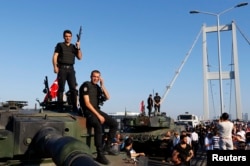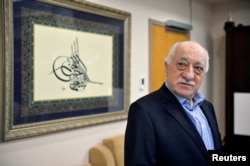In the face of growing international and domestic criticism under a presidential decree, several measures have been introduced to ease some of the most controversial aspects of Turkey’s State of emergency.
The heavily criticized 30-day pretrial detention period has been reduced to 14 and a four-day ban on detainees seeing their lawyer has been dropped.
"That is positive,”said Andrew Gardner, Turkey researcher for Britain-based human rights group Amnesty International, “it remains an important move, 30 days of pre-charge detention is far too long, and especially what we have seen of arbitrary denials of people to access lawyers continuing allegations of ill-treatment and torture in places of police detention, this is a really badly needed reform."
But Gardner stressed the reforms did not go far enough. More than 40,000 people have been detained and more than 100,000 removed from their jobs since the state of emergency was introduced after July’s failed coup.
Pressure growing
Criticism has been steadily growing, in particular from Europe. Many analyst suggest the reforms are a response to the pressure.
"Turkey cannot really afford to break its relations totally with Europe and the European legal system,” pointed out International relations expert Soli Ozel of Istanbul’s Kadir Has University, “therefore, in order to avoid a censoring from the Council of Europe Parliament, it has basically softened some of the things about detention and whatever, and at least escaped an emergency meeting over Turkey’s democratic rule."
The Council of Europe narrowly rejected a motion calling for an Emergency debate on Turkey. But analysts warn Turkish democracy could be discussed at the next parliamentary meeting in June.
Ozel argues Ankara is becoming increasingly aware that mitigating growing international criticism is key to maintaining foreign investor confidence in Turkey, “The only way people will trust there will at least in economic terms a rule of law in this country if Turkey maintain its ties to the legal structures of Europe, whatever it be in the European union or council of Europe,” said Ozel.
Under the state of emergency over 300 companies have been seized, worth an estimated $15 billion. The companies seized are part of the crackdown on people linked to the failed coup. All the owners are accused of being followers of the U.S.-based Islamic cleric Fethullah Gulen who Ankara accuses of being behind Julys failed coup.
“This country is increasingly viewed as no longer a country of rule of law everything is becoming arbitrary,” warned Atilla Yesilada of Global Source Partners, “international investors are extremely anxious there is no new money coming in from my personal contacts I think there is exasperation with Turkey.“ On Friday Fitch the last international rating agency to give Turkey an investor grade, downgraded the country, citing political instability.
Reform called "window dressing"
Countering such concerns the government has also announced the creation of a seven-person commission to offer redress to people who have lost their jobs or had businesses seized under emergency rule. Prime Minister Binali Yildirim announcing the measure said it aimed at protecting those who may have been “victimized” under the state of Emergency.
But Amnesty International's Gardner argues given the commission appears to be little more than window dressing.
"It is just seven people looking into 90,000 or individual people dismissed, thousands of institutions have been closed down. So really if you look at it from a capacity perspective it is not possible to examine these claims. Also, the seven people who most of them will be appointed by the very ministries that have dismissed people. So it is not an independent appeal, it is an administrative appeal and the criteria for the appeal is not clear."
Gardner also said the commission could be viewed as an attempt to delay people seeking redress at the European Court of Human Rights. A person normally can only file a case at the court after all domestic avenues of legal redress have been exhausted.
Since the state of emergency, the number of applicants filing cases at the European Court has nearly doubled from 8,400 in 2015 to 15,800, in 2016.
Analysts point out, the announced measures could well in part be motivated by the forthcoming referendum expected in April, on extending the powers of the president. With critics accusing both the government and president of authoritarianism, a softening of state of emergency, superficially or not, could blunt such criticism, ahead of a widely predicted close vote.






